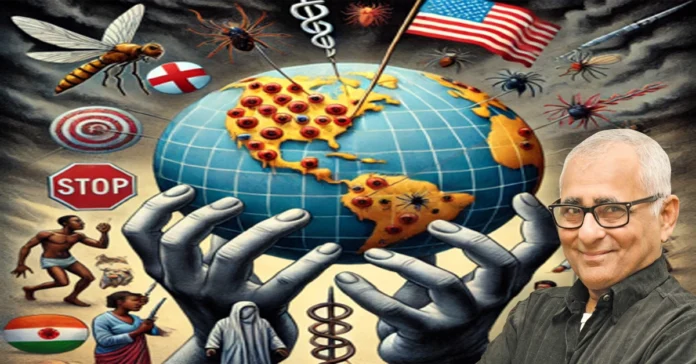By Inderjit Badhwar
There are moments in journalism when a story transcends its local borders and speaks to the entire world—a story so urgent, so chilling in its implications, that it demands to be amplified far beyond its country of origin. The investigative piece we are carrying in this issue of India Legal, originally published by ProPublica, is one such story.
It peels back the curtain on a chilling reality: that the health and survival of millions across the globe, particularly in vulnerable developing nations, can be sacrificed at the altar of ideological gamesmanship and political brinkmanship in Washington, DC. This is not just an American scandal—it is a global crisis with India firmly in its crosshairs.
At the heart of this exposé is the reckless suspension of critical US foreign-aid programmes for global health, including those targeting malaria, polio, tuberculosis, and HIV/AIDS. These programmes, funded through USAID and other US agencies, form the backbone of disease eradication and prevention efforts across large parts of Africa, South Asia, and beyond—including key regions in India. They fund everything from vaccines and diagnostic kits to public health infrastructure and community outreach.
The abrupt freezing of these funds—triggered by political infighting, far-right posturing, and cynical manoeuvres by figures like Donald Trump and his hardline allies—is nothing short of a death sentence for thousands. Lives are not theoretical in this calculus. They are real, and they will be lost because crucial medicines will not arrive, life-saving mosquito nets will not be distributed, and basic immunization campaigns will falter.
It is important for readers in India to understand that this isn’t just about faraway places. India, as one of the world’s largest recipients of US health aid—especially in areas like tuberculosis control—stands directly in harm’s way. India’s TB burden, already the highest in the world, has benefited enormously from USAID-funded programmes, ranging from advanced diagnostic technologies to innovative community outreach initiatives targeting at-risk populations.
When political leaders in the US, consumed by petty culture wars and election-year power plays, decide to kneecap these programmes, they are knowingly unleashing disease and death not just within their own borders, but across continents. Their myopic decisions ripple outward, disrupting delicate supply chains, starving global health programmes of vital resources, and jeopardizing hard-won progress in the fight against infectious diseases.
This calculated cruelty is dressed up in ideological justifications—the old bogeymen of “wasteful foreign aid,” “America First,” and pandering to isolationist, populist bases. But the facts are clear: these programmes have saved millions of lives, prevented countless outbreaks, and provided some of the best returns on investment in terms of global stability and health security. They also directly protect Americans from the inevitable boomerang effect of global pandemics, as Covid-19 so brutally demonstrated.
For India, the stakes are even higher. We are a country perpetually walking the tightrope between progress and vulnerability when it comes to public health. Our battle against tuberculosis, our efforts to eradicate polio, our constant struggle against mosquito-borne diseases like malaria and dengue—all of these depend not just on domestic initiatives, but on coordinated international support, expertise, and funding.
The suspension of these programmes is not just an “American problem”. It is a global betrayal. It is a loud signal to countries like India that we can no longer rely on external partnerships, no matter how long-standing or beneficial they may have been. It forces us to ask—what happens when ideology trumps science, when narrow nationalism smothers global cooperation, and when political vendettas dictate who lives and who dies?
By publishing this ProPublica investigation in India Legal, we are not merely echoing an American debate. We are sounding an alarm for policymakers, health experts, and civil society in India. We must learn from this unfolding disaster. We must recognize that the health of our poorest citizens can no longer be tethered to the political whims of another country. And we must ask ourselves whether India, with its own resources and expertise, is ready to step into the void left by American abdication.
The global health system is not some abstract, faraway apparatus. It is a fragile web connecting every country, every community, every individual—from the slums of Mumbai to the clinics of Malawi. When any one strand is severed, the entire web weakens.
The story you are about to read is not just an exposé. It is a warning. Ignore it at our own peril.


